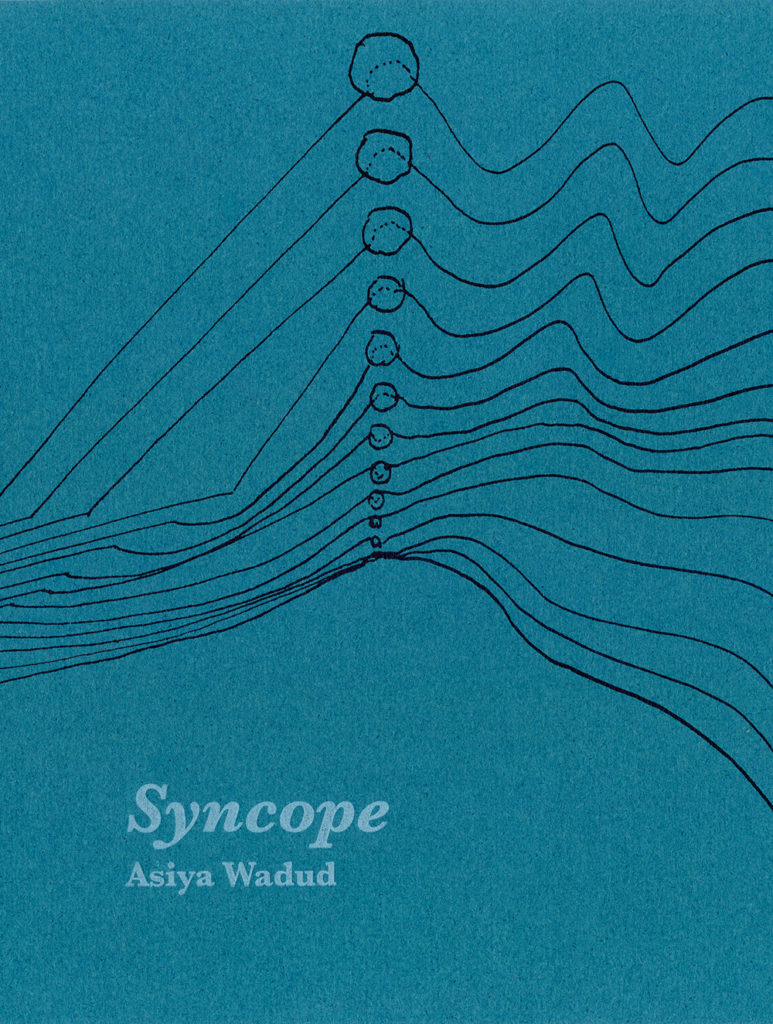let us establish a fact:
eyes are for seeing
naming is for subjugating
a vantage is an equivocated belief
a border is shorthand for retreat

let us establish a fact:
eyes are for seeing
naming is for subjugating
a vantage is an equivocated belief
a border is shorthand for retreat
Syncope represents one of poetry’s powers: to write the unwriteable, to bring voices, history, and lives forth from the depths.
John Keene
Through a series of prayers, invocations, and hymns, Syncope eulogizes those who have perished making Central Mediterranean crossings as well as collects first-hand accounts of those who have survived these perilous journeys. Forces of fate brought errant lives together for a hopeful safe passage and ultimately, linked these lives in their untimely deaths. Syncope attempts to shed some light on these lives, as well as the happenstance of living and dying while trying to cross a border.
Nominated for the 2020 Hurston/Wright Legacy Award in Poetry.
Asiya Wadud is the author of Crosslight for Youngbird (Nightboat Boks), day pulls down the sky/ a filament in gold leaf (written collaboratively with Okwui Okpokwasili) (Belladona*/ Danspace Project), Syncope (UDP) and No Knowledge Is Complete Until It Passes Through My Body (Nightboat Books). Asiya’s work has been supported by the Lower Manhattan Cultural Council, Danspace Project, and New York Public Library, among others.. Her work has been presented at LMCC’s River To River: Four Voices, Mount Tremper Arts, and Danspace Project and recent writing appears in e-flux journal, BOMB Magazine, Social Text Journal, FENCE, Makhzin, and elsewhere. She lives in Brooklyn, New York, where she teaches poetry at Saint Ann’s School, Columbia University, and Pacific Northwest College of Art.
Syncope works in the material of silence: silence as regard; silence as attention; silence as impossibility. Asiya Wadud’s threnody to the people of the Left-to-Die Boat rings with silence.
Dionne Brand
As I read Syncope I wonder what it is I read. A polyvocal record of the catastrophes. A drift traced in language and in ink. Wadud says: “a reckoning / a recitation / a dirge / an imprint.” She sets text in perpetual motion, signaling the locatable and insisting on a subject's ability to locate another (in language, in space, even across time and tense). So what can it mean to read the Left-to-Die boat then? To read, too, my own encounter as I hover above the page of this profound denunciation and devotion.
Aracelis Girmay
Syncope is poet Asiya Wadud’s profound, wrenching, and clarifying new book of poetry about the 2011 tragedy in which a boat filled with African migrants and refugees bound from Libya to Lampedusa, Italy was literally "left-to-die” in the Mediterranean. An act of recovery, of countermemory, of memorial, of resistance, Syncope represents one of poetry’s powers: to write the unwriteable, to bring voices, history, and lives forth from the depths.
John Keene
ISBN: 978-1-946433-29-9
Trade Paperback
Smyth-sewn; Letterpress Wrap. 80 pp, 5.5 x 7.375 in
Publication Date: September 01 2019
Distribution: Asterism Books (US), Coach House Books via Publishers Group Canada (Canada), Inpress Books (UK)